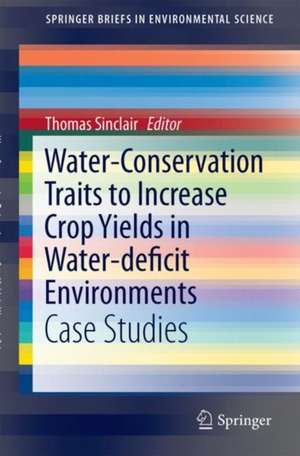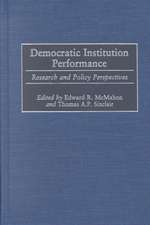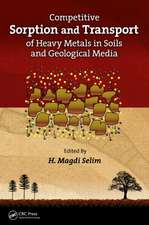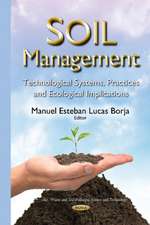Water-Conservation Traits to Increase Crop Yields in Water-deficit Environments: Case Studies: SpringerBriefs in Environmental Science
Editat de Thomas R. Sinclairen Limba Engleză Paperback – 22 mai 2017
This volume explores specific approaches that have shown to result in crop yield increases. Research on the physiological understanding of these methods has led to the development of practical applications of plant breeding approaches to genetically improve crops to achieve higher yields. Authoritative entries from crop scientists shed new light on two water-conservation traits: one that is based on an initiation of the decrease in transpiration earlier in the soil drying cycle, and the second that is based on a sensitivity of transpiration rate under high atmospheric vapor pressure deficit that results in partial stomatal closure. Both these approaches involve partial stomatal closure under well-defined situations to decrease the rate of soil water loss.
Readers will be able to analyze the circumstances under which a benefit is achieved as a result of the water-limitation trait; and key discussion points in the case studies presented willhelp answer questions such as what species, which environments, how often will yield be benefited for various crop species? Contributions also review the genetic variation for these two traits within each crop species and the physiological basis for the expression of these traits.
Din seria SpringerBriefs in Environmental Science
-
 Preț: 348.77 lei
Preț: 348.77 lei -
 Preț: 382.57 lei
Preț: 382.57 lei -
 Preț: 378.12 lei
Preț: 378.12 lei -
 Preț: 378.80 lei
Preț: 378.80 lei -
 Preț: 381.98 lei
Preț: 381.98 lei -
 Preț: 347.80 lei
Preț: 347.80 lei - 15%
 Preț: 464.18 lei
Preț: 464.18 lei -
 Preț: 378.12 lei
Preț: 378.12 lei -
 Preț: 377.53 lei
Preț: 377.53 lei -
 Preț: 379.09 lei
Preț: 379.09 lei -
 Preț: 381.00 lei
Preț: 381.00 lei -
 Preț: 383.93 lei
Preț: 383.93 lei -
 Preț: 175.58 lei
Preț: 175.58 lei -
 Preț: 475.83 lei
Preț: 475.83 lei -
 Preț: 380.07 lei
Preț: 380.07 lei -
 Preț: 378.92 lei
Preț: 378.92 lei -
 Preț: 411.93 lei
Preț: 411.93 lei -
 Preț: 375.62 lei
Preț: 375.62 lei -
 Preț: 375.45 lei
Preț: 375.45 lei -
 Preț: 378.92 lei
Preț: 378.92 lei -
 Preț: 377.57 lei
Preț: 377.57 lei -
 Preț: 377.35 lei
Preț: 377.35 lei -
 Preț: 378.34 lei
Preț: 378.34 lei -
 Preț: 344.67 lei
Preț: 344.67 lei -
 Preț: 374.30 lei
Preț: 374.30 lei -
 Preț: 362.43 lei
Preț: 362.43 lei -
 Preț: 446.26 lei
Preț: 446.26 lei - 5%
 Preț: 361.96 lei
Preț: 361.96 lei -
 Preț: 376.43 lei
Preț: 376.43 lei -
 Preț: 380.63 lei
Preț: 380.63 lei -
 Preț: 375.84 lei
Preț: 375.84 lei - 15%
 Preț: 463.20 lei
Preț: 463.20 lei -
 Preț: 383.33 lei
Preț: 383.33 lei -
 Preț: 375.23 lei
Preț: 375.23 lei -
 Preț: 377.57 lei
Preț: 377.57 lei -
 Preț: 381.59 lei
Preț: 381.59 lei -
 Preț: 379.48 lei
Preț: 379.48 lei -
 Preț: 376.04 lei
Preț: 376.04 lei -
 Preț: 413.84 lei
Preț: 413.84 lei -
 Preț: 381.81 lei
Preț: 381.81 lei -
 Preț: 352.28 lei
Preț: 352.28 lei -
 Preț: 381.81 lei
Preț: 381.81 lei -
 Preț: 381.98 lei
Preț: 381.98 lei - 5%
 Preț: 331.65 lei
Preț: 331.65 lei -
 Preț: 375.62 lei
Preț: 375.62 lei -
 Preț: 377.95 lei
Preț: 377.95 lei -
 Preț: 413.45 lei
Preț: 413.45 lei -
 Preț: 267.19 lei
Preț: 267.19 lei -
 Preț: 373.73 lei
Preț: 373.73 lei -
 Preț: 375.62 lei
Preț: 375.62 lei
Preț: 377.35 lei
Nou
Puncte Express: 566
Preț estimativ în valută:
72.22€ • 75.12$ • 59.62£
72.22€ • 75.12$ • 59.62£
Carte tipărită la comandă
Livrare economică 14-28 aprilie
Preluare comenzi: 021 569.72.76
Specificații
ISBN-13: 9783319563206
ISBN-10: 3319563203
Pagini: 95
Ilustrații: X, 95 p. 25 illus., 4 illus. in color.
Dimensiuni: 155 x 235 x 6 mm
Greutate: 0.16 kg
Ediția:1st ed. 2017
Editura: Springer International Publishing
Colecția Springer
Seria SpringerBriefs in Environmental Science
Locul publicării:Cham, Switzerland
ISBN-10: 3319563203
Pagini: 95
Ilustrații: X, 95 p. 25 illus., 4 illus. in color.
Dimensiuni: 155 x 235 x 6 mm
Greutate: 0.16 kg
Ediția:1st ed. 2017
Editura: Springer International Publishing
Colecția Springer
Seria SpringerBriefs in Environmental Science
Locul publicării:Cham, Switzerland
Cuprins
Chapter1. Introduction.- Chapter2. Early Partial Stomata Closure with Soil Drying.- Chapter3. Limited-Transpiration Rate Under Elevated Atmospheric Vapor Pressure Deficit.- Chapter4. Soybean.- Chapter5. Peanut.- Chapter6. Chickpea.- Chapter7. Lentil.- Chapter8. Maize.- Chapter9. Sorghum.- Chapter10. Pearl Millet.- Chapter11. Wheat.
Notă biografică
Dr. Thomas R. Sinclair is an adjunct professor in crop science at North Carolina State University. His research focuses on the interactions between plant physiology and the environment to determine crop yields. He is currently investigating plant traits that may increase drought tolerance.
Textul de pe ultima copertă
This volume explores specific approaches that have shown to result in crop yield increases. Research on the physiological understanding of these methods has led to the development of practical applications of plant breeding approaches to genetically improve crops to achieve higher yields. Authoritative entries from crop scientists shed new light on two water-conservation traits: one that is based on an initiation of the decrease in transpiration earlier in the soil drying cycle, and the second that is based on a sensitivity of transpiration rate under high atmospheric vapor pressure deficit that results in partial stomatal closure. Both these approaches involve partial stomatal closure under well-defined situations to decrease the rate of soil water loss.
Readers will be able to analyze the circumstances under which a benefit is achieved as a result of the water-limitation trait; and key discussion points in the case studies presented will help answer questions such as what species, which environments, how often will yield be benefited for various crop species? Contributions also review the genetic variation for these two traits within each crop species and the physiological basis for the expression of these traits.
Caracteristici
Broadens our understanding of water-conservation traits for various crops to achieve greater crop production output Provides perspective for future research activities to improve crop drought tolerance Will appeal to university scientists, private investigators, and public non-university researchers in crop science agronomy and environmental science Includes supplementary material: sn.pub/extras








